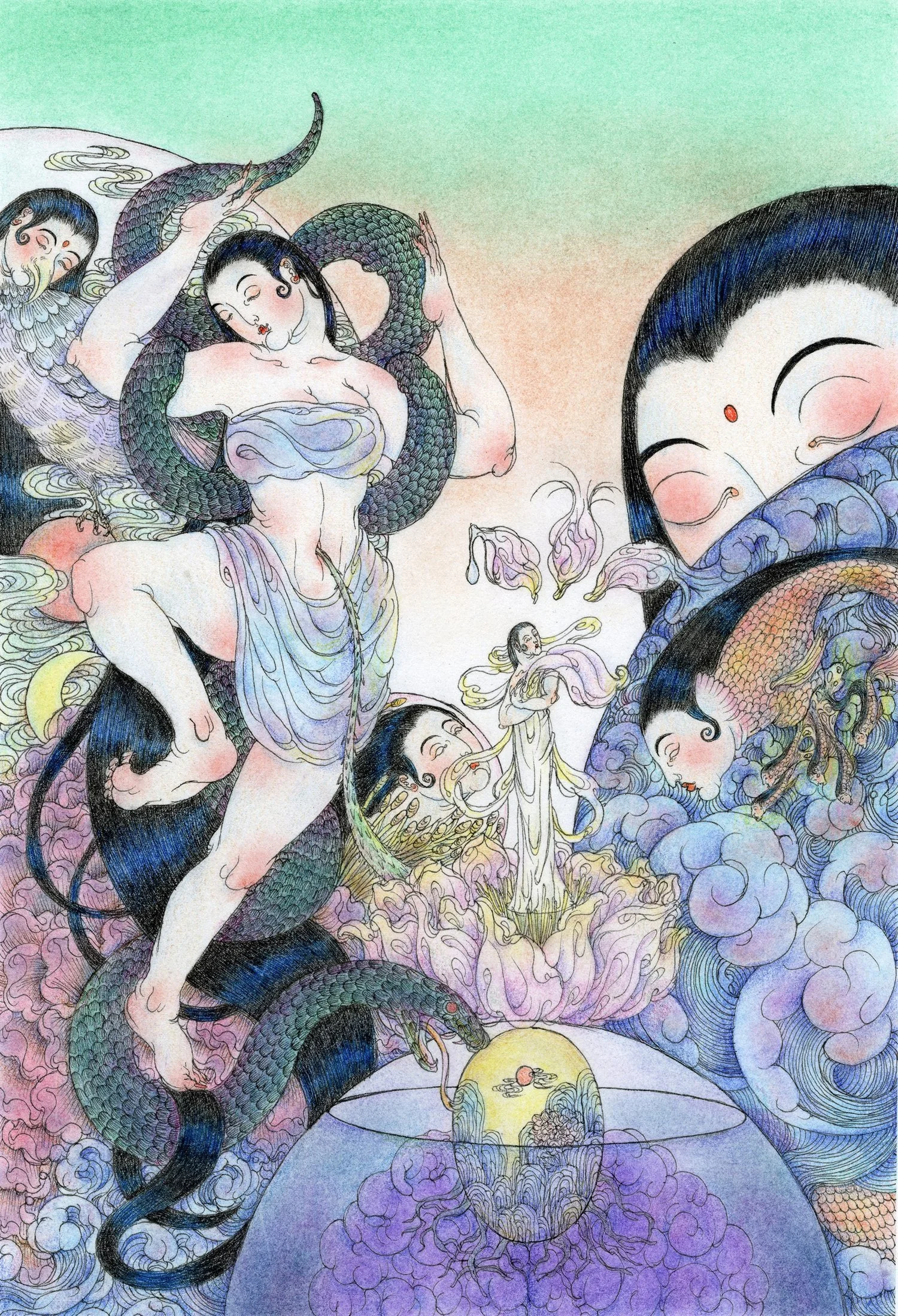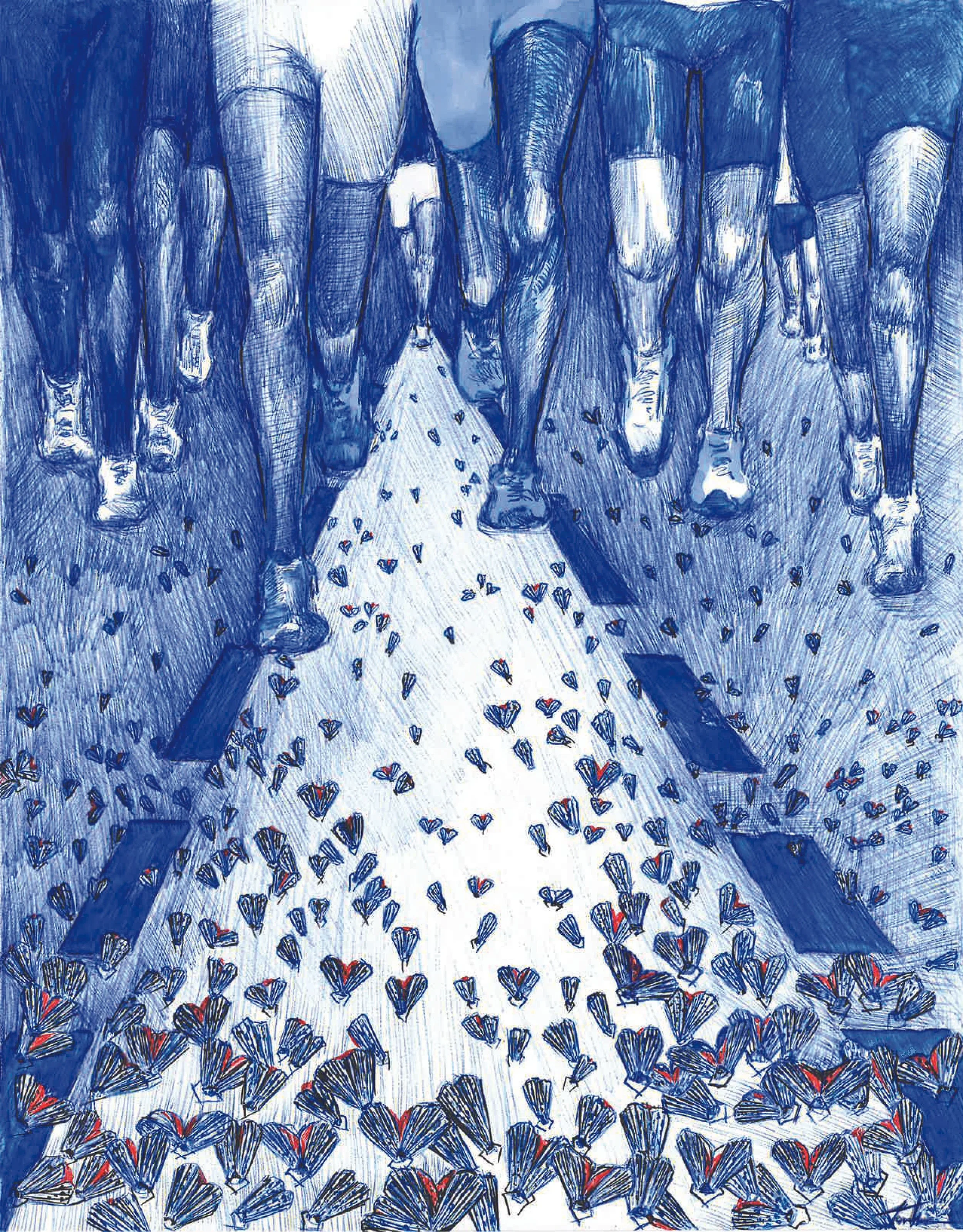10 Questions with Zijun Zhao (Mosa)
Al-Tiba9 Art Magazine ISSUE12 | Featured Artist
Zijun Zhao (Mosa) graduated from the School of Visual Arts in New York City. Almost all her drawings are based on the recognition and pride of her Asian identity and also the conflict between real life and the illusional world, including her point of view on life and death, value and self-cognition, losing her self and finding it back. Every drawing is a process of quarreling with herself that she is creating a world without logic but with order, where she has an opportunity to feel safe.
Zijun Zhao (Mosa) - Portrait
喜丧 (A Joyful Funeral) | Project description
"喜丧" (A Joyful Funeral) in the traditional Chinese sense refers to the death of the elderly without disaster and disease, but I keep thinking that if people are old, their appearance and physical function are not as young as they are, and they have many troubles with the growth of age for no reason, so why is it "喜" (joyful)? Therefore, the work "喜丧" (A Joyful Funeral) is my understanding of death, even a good wish. The mainline's meaning and expression are pushed from the lower right corner to the upper left corner.
The mourners, memorial tablets, altar, white sails, and blown paper money are in the lower right corner. Her vision is only limited to the root of the tree. At the same time, her world and fantasy are separated by the tree. The posture of the three gods connects their bodies, indicating a cycle in which the material absorbed by the tree roots from the ground rises, blooms, and connect to the ground again. At the same time, it is a person's life - from nothing to blooming, returning to the earth. The sad expression in the mirror in the goddess's hand on the far left is that I have observed many people, including myself, are always sad when trying to think about death, even on a national level. The fish with a human face in the middle is the cycle and dependence of water and life - breaking away from the water but returning to the water.
The giant's face on the left, with cold skin, was a woman who began to die. Her tears and last breath turned into another form of life - what she wanted to become and become again; The image of boating in the lower-left corner comes from ancient Greek mythology. When people die, they will cross the Styx River by boat. In the middle of her forehead is the exit of her soul. It becomes a moth. Many older people in China say that people will become giant butterflies or moths to visit their relatives after death. However, I think death is just a random point in the infinite cycle, neither the beginning nor the end, so there is nothing to worry about. Therefore, the death described as "喜" (joy) is not as good as turning into a bird and eating the concerns.
A Joyful Funeral, ink, color pencil and pastel on paper, 36x24.8cm, 2021 © Zijun Zhao (Mosa)
Get your limited edition copy now
INTERVIEW
Let's start from the basics. How did you get involved with art, and what influenced you to follow this path?
Both of my parents graduated from art school, so I grew up loving to draw and paint. When I got involved with art after I went to college, it was more of a natural and autonomous choice because I think art is a very intuitive and emotional way of expression.
Do you remember when you first decided to become an artist? Do you still feel the same motivation nowadays?
I don't think being able to draw and being an artist are very much the same to me. Before my second year of college, I only said I could draw, but the decision to become an artist was made in my third year of college. At that time, I wanted to be a gallery artist because I could draw anything without limitations. Now I am sticking to my decision and supporting my dream through many things.
Creation, ink, color pencil and pastel on paper, 19x27.8 cm, 2021 © Zijun Zhao (Mosa)
Maternity, ink, color pencil and pastel on paper, 19x27.6 cm, 2021 © Zijun Zhao (Mosa)
Your work focuses on the recognition and pride around your Asian identity. How much does your background influence your current work?
I think the Asian identity in my work manifests itself in many ways. I like the joy or sadness or even the horror in the Chinese elements. I don't really think about whether everything I am drawing is related to my identity background, but I am a person who grew up in a typical Chinese environment, so when I finish my work, I will always see some of my childhood experiences, traditional Chinese concepts and so on.
Where do you find inspiration for your artworks? Do you have any artist or movement you look up to, or is your inspiration more organic, coming from everyday life?
The inspiration for my work almost always comes from my moods and feelings during the time of creation. A lot of the compositions and elements just piece themselves together in my brain into a basically complete story. It's like a diary that I pick up and look at long after I've finished and remember how I felt at the time.
A Joyful Funeral, ink, color pencil and pastel on paper, 56x76cm, 2022 © Zijun Zhao (Mosa)
In your work, you often look at traditional elements from a new perspective, like in "喜丧" (A Joyful Funeral). How did you come up with this concept?
I was at an emotional low point when I created A Joyful Funeral. My life was in a terrible state at that time, so I started to think about something as nebulous as meaning and the end.
Your paintings and drawings are often full of symbols. What do you wish the viewers to notice first? And what do you ultimately want to communicate with your works?
I do always want the audience to have a strong sense of empathy when they see my work. For example, some elements combine to show a process of the conflict between me and myself.
Do you have any other theme or technique you would like to introduce to your work?
I would like to try some more unstable mediums to create randomness.
New, ink, color pencil and pastel on paper, 36x24.5 cm, 2022 © Zijun Zhao (Mosa)
What are you working on right now? Do you have any new projects or series you are currently developing?
Actually, I haven't been working on anything for almost three months. It's not that I'm uninspired, but just because my life situation has suddenly changed, so I need to find that breaking point before I can continue to create new content.
As we are at the beginning of 2023, what do you hope to accomplish this year regarding career goals and personal life?
I think my biggest goal lately is to keep improving my work, find a mature style and find gallery representation opportunities.
Finally, where do you see yourself five years from now?
Only a small part I think, but I'm happy to accept all the uncertainty.

























